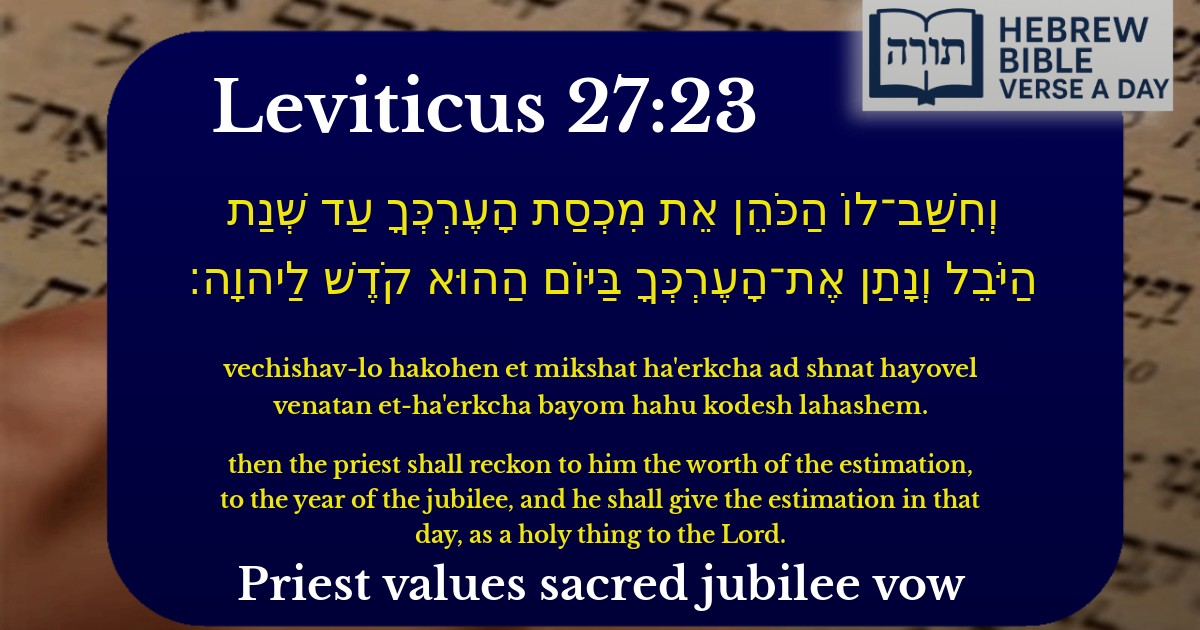Join Our Newsletter To Be Informed When New Videos Are Posted
Join the thousands of fellow Studends who rely on our videos to learn how to read the bible in Hebrew for free!
Hebrew Text
וְחִשַּׁב־לוֹ הַכֹּהֵן אֵת מִכְסַת הָעֶרְכְּךָ עַד שְׁנַת הַיֹּבֵל וְנָתַן אֶת־הָעֶרְכְּךָ בַּיּוֹם הַהוּא קֹדֶשׁ לַיהוָה׃
English Translation
then the priest shall reckon to him the worth of the estimation, to the year of the jubilee, and he shall give the estimation in that day, as a holy thing to the Lord.
Transliteration
Vechishav-lo hakohen et mikshat ha'erkcha ad shnat hayovel venatan et-ha'erkcha bayom hahu kodesh lahashem.
Hebrew Leining Text
וְחִשַּׁב־ל֣וֹ הַכֹּהֵ֗ן אֵ֚ת מִכְסַ֣ת הָֽעֶרְכְּךָ֔ עַ֖ד שְׁנַ֣ת הַיֹּבֵ֑ל וְנָתַ֤ן אֶת־הָעֶרְכְּךָ֙ בַּיּ֣וֹם הַה֔וּא קֹ֖דֶשׁ לַיהֹוָֽה׃
וְחִשַּׁב־ל֣וֹ הַכֹּהֵ֗ן אֵ֚ת מִכְסַ֣ת הָֽעֶרְכְּךָ֔ עַ֖ד שְׁנַ֣ת הַיֹּבֵ֑ל וְנָתַ֤ן אֶת־הָעֶרְכְּךָ֙ בַּיּ֣וֹם הַה֔וּא קֹ֖דֶשׁ לַיהֹוָֽה׃
🎵 Listen to leining
Parasha Commentary
📚 Talmud Citations
This verse is quoted in the Talmud.
📖 Arakhin 6b
The verse is discussed in the context of the laws of valuations (Arakhin) and how the priest calculates the value of a person's pledge to the Temple until the Jubilee year.
📖 Arakhin 7a
Further discussion on the calculation of valuations and the sanctification of the pledged amount to the Lord.


Context in Vayikra (Leviticus)
The verse (Vayikra 27:23) appears in the section discussing erchin (vows of valuation) and the sanctification of property. It details how a priest calculates the monetary value of a person's pledge to the Beit HaMikdash, taking into account the time remaining until the Yovel (Jubilee) year.
Explanation of the Valuation Process
Rashi explains that the priest assesses the value based on the years remaining until Yovel, as land reverts to its original owner during Yovel. Thus, if one consecrates a field, its value is determined by how many years of use remain before Yovel. The Rambam (Hilchot Arachin 4:12-13) elaborates that this applies specifically to ancestral land (sdeh achuzah), where the valuation decreases proportionally as Yovel approaches.
Significance of "Kodesh LaHashem"
The phrase "kodesh laHashem" ("a holy thing to the Lord") emphasizes that once consecrated, the item or its equivalent value becomes irrevocably sanctified. The Sifra (a halachic Midrash on Vayikra) teaches that this teaches the irrevocable nature of sanctification—once declared, it cannot be nullified by the original owner.
Halachic Implications
Spiritual Message
The Midrash (Vayikra Rabbah 37:4) connects this to the broader idea of dedicating one's possessions to divine service. By linking the valuation to Yovel—a time of liberation and return—it teaches that material offerings should reflect a commitment to spiritual renewal and divine ownership.